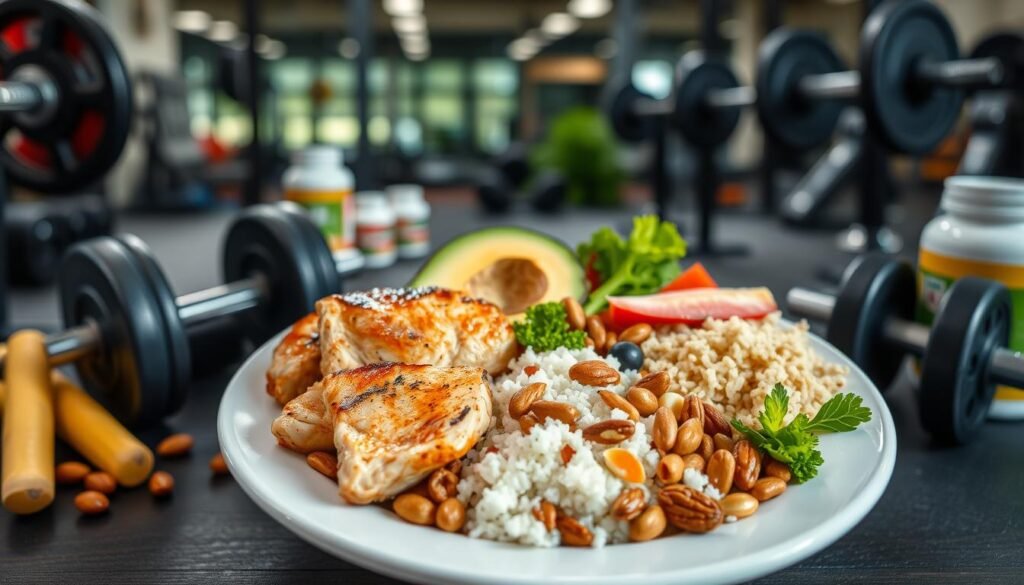A surprising 90% of people don’t get enough essential vitamins and minerals every day. This fact makes us wonder about the need for multivitamins during a bulk. Are they vital for muscle growth, recovery, and health? While focusing on macronutrients and protein is common, micronutrients are often forgotten. Knowing how multivitamins can boost a diet and exercise plan helps decide if they’re important for your fitness journey. Let’s dive into various views on multivitamins and their role in improving muscle strength and recovery.
Key Takeaways
- Multivitamins may help fill nutrient gaps in the diet.
- Micronutrient deficiencies can hinder muscle growth and recovery.
- Consulting with healthcare professionals can assess individual needs.
- Protein intake is crucial for muscle gain in active individuals.
- Overall health is essential during a bulking phase to optimize performance.
Understanding the Role of Multivitamins in Muscle Growth
Understanding the role of multivitamins in muscle growth starts with nutrition. It’s key in an athlete’s diet. Multivitamins are seen as crucial for boosting performance and recovery. They ensure athletes get the micronutrients they need. Yet, a diet rich in whole, plant-based foods can meet these nutritional needs too.
A study with 32 people who train regularly looked into vitamin C and E’s impact on strength. They worked out hard four times a week for 10 weeks. The study found these vitamins didn’t help increase muscle size. In fact, they might even reduce strength gains in exercises like the bicep curl. This shows multivitamins should back up a good diet, not replace it.
At the heart of getting great results is good nutrition. The role of multivitamins is to aid those who train hard. Vitamins such as C, D, and E boost health and fight sickness. B vitamins help keep your mood stable and mind sharp. Including various fruits, veggies, and grains in your diet fulfills your training needs. This leads to better muscle growth and repair.
Why Consider Multivitamins During a Bulk?
When bulking up, it’s important to focus on health and muscle growth. Addressing micronutrient shortages is key. This is because eating more calories can lead to missing out on vital vitamins and minerals. These nutrients are essential for good performance and quick recovery.
Addressing Micronutrient Deficiencies
Micronutrient shortages can slow bulking progress. For high energy and good protein use, vitamins like B12 are crucial. Biotin helps turn food into energy and supports muscle growth. Also, vitamin C is important for cell growth and fixing muscles, especially for those over 50.
Enhancing Nutrient Density in Your Diet
It is crucial to add more nutrients to your diet when you’re trying to eat enough from whole foods. Even with lean meats, fruits, and veggies, you might not get all the vitamins you need. Multivitamins are a good fix for this, especially on busy days when you can’t prepare meals. Considering over half of Americans take a daily multivitamin, it’s clear that many understand its benefits during bulking.
How Macronutrient Ratios Impact Your Bulking Phase
The journey through a bulking phase is profoundly influenced by the careful balance of macronutrient ratios. To support muscle growth effectively, he should focus on proteins, carbohydrates, and fats in ways that promote both gains and overall health. Understanding these ratios helps in establishing a roadmap for achieving the desired physique.
Balance of Proteins, Carbs, and Fats
For optimal muscle gains, a balanced macronutrient distribution is essential. The recommended macro ratio typically ranges from 10-35% protein, 45-65% carbohydrates, and 20-35% fats. Protein intake should hover between 1.6 to 2.2 grams per kilogram of body weight.
Carbohydrates serve as the primary energy source, which fuels workouts and enhances performance. After meeting protein and fat needs, he should prioritize carbohydrates to boost workout efficacy.
Importance of Maintaining a Calorie Surplus
Maintaining a calorie surplus is key to a successful bulking phase. A daily surplus of 250-500 calories above maintenance level proves effective. This helps in promoting muscle gains.
For trained individuals, a surplus of 250-400 calories is advisable. Untrained individuals may benefit from a higher intake of 400-800 calories. This surplus is crucial for muscle synthesis while keeping fat gain minimal.
Adjusting calorie intake every 4-6 weeks prevents plateaus, ensuring progress. Regularly monitoring weight and body composition, preferably 1-2 times a week, is vital. It’s important for assessing effectiveness during this phase.

In conclusion, understanding and applying the correct macronutrient ratios is indispensable for anyone aiming to excel in their bulking phase. For more detailed insights, check out this resource on macronutrients for bulking.
Exploring Different Multivitamin Formulations
The multivitamin market is wide and varied, especially for athletes and fitness buffs. These products range from general health aids to specific supplements that boost muscle growth and recovery. It’s key for individuals wanting better nutrition during their bulk phase to understand these options.
When picking a multivitamin, it’s important to choose one that includes not just vitamins but also vital minerals and other nutrients. Stuff like creatine, calcium, and vitamin C are crucial because they help with energy and muscle health. Vitamins A, C, D, and the B complex play a big part in staying healthy with a tough workout schedule.
A study found that almost a third of multivitamins didn’t hit quality targets, with some nutrient levels not matching what the label said. For example, some had only 14% of the advertised vitamin D. Others had too much niacin or vitamin B-6. This shows why picking top-notch multivitamins is a must to get the most benefit and avoid too much of a nutrient.
Lately, the rise of plant-based multivitamin options reflects the higher demand for vegetarian and vegan products. Methods like liposomal encapsulation are being used to help our bodies absorb nutrients better. Leading brands like Solgar, Thorne, and Doctor’s Best are working hard to offer high-quality, research-backed products.
Adding multivitamins when bulking up can help deal with common nutritional gaps found in many diets. Many folks have at least one nutrient they don’t get enough of, making personalized supplements important. The aim is to balance diet-based nutrients and supplements for the best nutrition.

When deciding on a multivitamin, knowing the differences between them helps people pick the right one for their dietary needs. For more on micronutrients and muscle building, the best multivitamin resources can offer in-depth knowledge. Remember, combining whole foods with supplements is key to lasting health.
Multivitamins During a Bulk: Do You Really Need Them?
When bulking up, you might wonder if you need multivitamins. It depends on your body’s unique needs, which vary based on diet, way of life, and how intense your workouts are. Checking what you eat can show if you’re missing key nutrients. Knowing what’s missing can help you decide if you should take extra vitamins.
Assessing Personal Nutritional Needs
To know what nutrients you might need, look at what you eat and your fitness goals. Reviewing your meals can help spot missing micronutrients. These gaps can slow down your progress and recovery. If you can’t get enough nutrients from food, adding multivitamins might be a good idea.
Consulting with Healthcare Professionals
Before you start taking multivitamins, it’s smart to talk to a health expert. Dietitians or nutritionists can offer advice that fits your health and what you like to eat. They can craft a plan that helps you meet your bulking goals safely and effectively. This plan helps figure out the best supplements for top results during your bulk.

The Impact of Bioavailability on Supplement Efficiency
Bioavailability is key in how well our bodies use nutrients from supplements. The form of the nutrient and how you take it really matters. Knowing about these can help people looking to improve their health and build muscle.
Understanding Nutrient Absorption
The body’s capacity to take in vitamins and minerals varies. This is crucial for getting benefits from supplements.
- Nutrient Form: The chemical makeup of a supplement can impact its bioavailability. For example, mineral chelates are absorbed better than inorganic forms.
- Consumption Method: How you take nutrients can affect absorption. Vitamins A, D, E, and K need fats to be absorbed well.
- Digestive Health: A healthy digestive system helps with better nutrient absorption. Probiotics and enzymes improve how well the body uses nutrients.
- Timing and Dosage: Taking supplements at the right time and in the right amounts is important for getting the most out of them.
Nutrient absorption is closely tied to supplement success. Athletes and active people should ensure they get enough micronutrients. Multivitamins can help, especially if they are designed for better bioavailability and digestion.
Real Food vs. Supplement: A Comparison
The debate about real food versus supplements centers on getting essential nutrients best. Each offers unique benefits affecting health and performance. Knowing the differences is key for people wanting better nutrition, like those bulking up.
The Benefits of Whole Foods
Whole foods are more than vitamins and minerals. They offer:
- Fiber: Key for digestive health and blood sugar control.
- Phytochemicals: Boost overall health and offer antioxidant perks.
- Natural Vitamins and Minerals: From food, these are better absorbed than synthetic supplements.
Studies show getting nutrients from whole foods can lower chronic disease risk. Whole foods support all-around health, not just nutrition.
When Supplements Can Be Advantageous
Supplements help certain groups, like vegans and the elderly avoid nutrient gaps. Benefits of supplements include:
- Convenience: A fast way to get nutrients missing from meals.
- Targeted Nutrient Support: Essential for those at risk, like vitamin D for some.
- Quality Assurance: Certified products guarantee purity, like NSF Certified for Sport ones.
For instance, vitamin D is hard to get from food alone, making supplements useful. Although not checked by the FDA, good brands test their products for quality and safety.
| Aspect | Real Food | Supplements |
|---|---|---|
| Nutrient Density | High in multiple nutrients | Targeted nutrients available |
| Bioavailability | Generally high | Varies by formulation |
| Fiber Content | Rich source | Usually absent |
| Convenience | Needs meal prep | Simple to consume anywhere |
| Safety Regulations | Well regulated | Regulations less strict |
A mix of real food and supplements might be best, depending on your situation. This combination strategy can achieve the best health and performance outcomes.
Balancing Supplement Stacks for Optimal Results
When bulking up, choosing the right supplements is key. It involves looking at your diet, how hard you train, and your fitness goals. Every supplement should serve a purpose and work together to boost your performance and help you recover.
Choosing the Right Supplements
It’s essential to focus on what a supplement does and its quality. For instance, take the Legion Muscle Growth Stack or the Momentous Athletic Resilience Bundle. They meet specific needs. The first one has ingredients like citrulline malate and creatine. The second offers grass-fed whey protein and collagen peptides. Both are known for their high quality and effectiveness, highlighting the importance of choosing the right supplements for the best results.
Integrating Multivitamins with Other Supplements
Adding multivitamins to your supplement mix covers all nutrition bases. They fill any dietary gaps and enhance overall health, while other supplements, such as BCAAs, help with muscle upkeep. It’s crucial not to double up on the same nutrients to keep things in balance. For example, combining a top-notch whey protein with a multivitamin covers recovery and nutrient needs without going overboard. This smart mix maximizes health benefits without waste.
Conclusion
Looking at multivitamins during bulking up, we see they can be really helpful. Yet, not everyone may need them. It depends on how you eat and what nutrients you already get. For those getting serious about fitness, eating good foods is key. You need lots of protein to grow muscles and recover well.
Getting to know micronutrients makes a big difference in food choices. A lot of people don’t eat enough fruits, vegetables, and grains. This means they might not get enough vitamins, which can affect health and even how we think. If nutrition is hard for you, it’s a good idea to talk to a doctor. They can help make a plan that might include vitamins.
To reach your fitness goals and stay healthy, mix a good diet with exercise and smart supplement use. Real foods along with the right vitamins help you stay on track. They keep you well and can lower the risk of getting sick or having heart problems. By following these tips, you can build a strong base for both fitness and health.